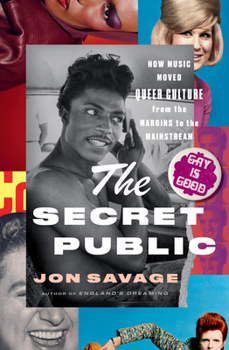The Secret Public: How Music Moved Queer Culture from the Margins to the Mainstream
Jon Savage, the author of the canonical England's Dreaming, explodes new ground in this electrifying history of pop music from 1955 through 1979. In demonstrating that gay and lesbian artists were responsible for many of the greatest cultural breakthroughs in the last half of the twentieth century, he shows that it was their secretly encoded music--appealing to a closeted but greatly oppressed public--which led to the historic dismantling of discriminatory gay laws and the fusion of queer and straight culture.
Fittingly, Savage's kaleidoscopic work begins with the pomp-and-pompadour appearance of Little Richard, whose relentlessly driving sound, replete with gospel shrieks and sexual contortions, enthralled a generation of 1950s stultified white teenagers. Things soon went mainstream, as Elvis enthralled a nation with his seductive low moans and bump-and-grind twists, heavily derivative of Black music, while James Dean and Rock Hudson became the face of 1950s Hollywood; yet this explosion of queer expression remained covert and could not be accepted for what it was.
While music, with supporting roles from cinema and fashion, became the key medium through which homosexuality could be clandestinely enacted, overt expressions of gay behavior were met with arrests and crackdowns. While hippies reveled in 1967's "Summer of Love," gays remained "harassed by police, demonized by the media and politicians, imprisoned simply for being who they were." J. Edgar Hoover, himself a closeted homosexual, continued to spy on homosexual deviants; CBS's Mike Wallace aired an invidious show about homosexuality; and the New York police continued to raid gay bars.
Yet the music itself produced a cultural eruption that simply could not be stanched. While Bette Midler sang "Boogie Woogie Bugle Boys" to a Continental Baths audience of 600 gay men, all naked except for towels, David Bowie "blew the whole topic wide open" and "became the most totemic pop star of his generation." Even though roadblocks remained, the gear-grinding crunch of the music signaled that the gay civil rights movement could no longer be suppressed.
Ending the narrative with the sudden collapse of disco, The Secret Public asserts then that the genie was out of the bottle, that queer culture had finally entered the mainstream, producing a transcendent vision of pop culture that could never be marginalized again.





